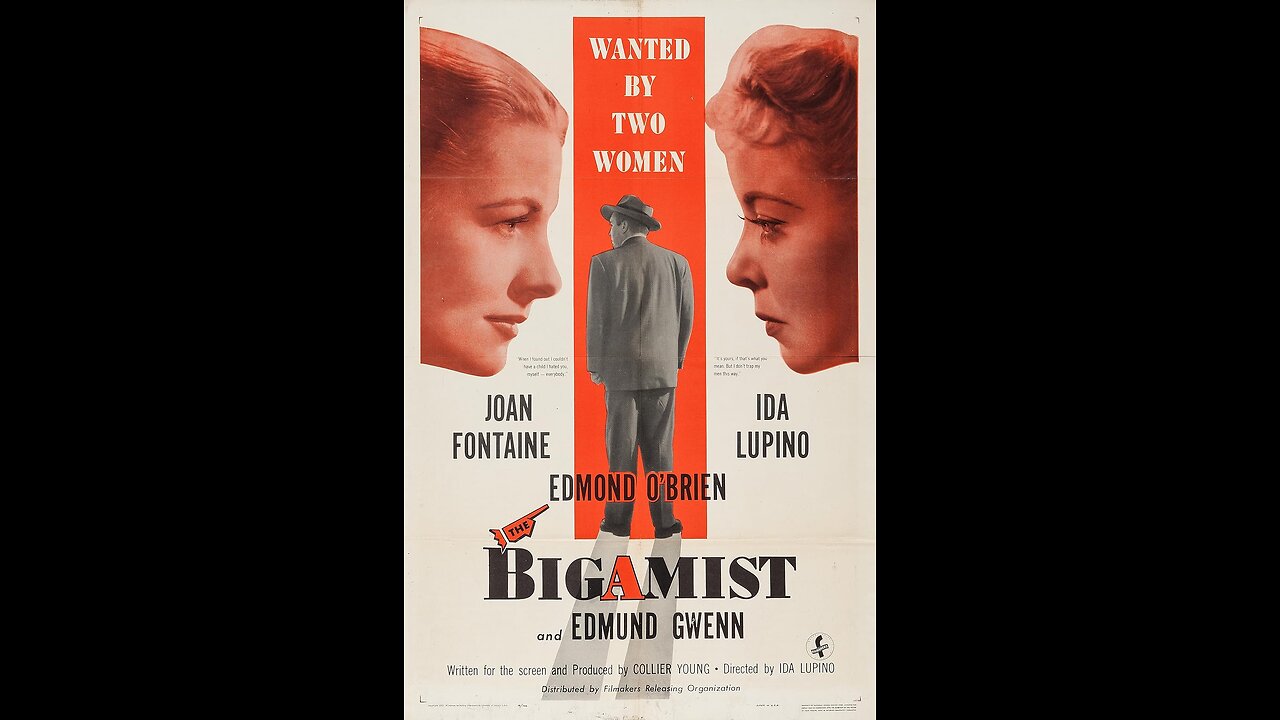Premium Only Content

The Bigamist (1953) | American drama film directed by and starring Ida Lupino
"The Bigamist" is a 1953 American drama film directed by and starring Ida Lupino. Lupino co-wrote the screenplay with her then-husband Collier Young. The film explores the complex and morally challenging story of a man leading a double life as a bigamist.
The story revolves around Harry Graham (Edmond O'Brien), a salesman who travels frequently for business. Harry is married to Eve (Joan Fontaine), and the couple runs a successful business together. However, as Harry's work requires him to travel extensively, he becomes lonely during his trips and finds solace in the company of Phyllis (Ida Lupino), a waitress.
Unbeknownst to Eve, Harry starts a relationship with Phyllis, and their connection deepens over time. Eventually, Harry finds himself caught in a dilemma as he becomes emotionally invested in both relationships. When Phyllis discovers that Harry is already married, she confronts him, leading to a series of events that unravel the secret he's been hiding from both women.
The film employs a non-linear narrative, with a significant portion of the story told through a courtroom framing device. As the legal proceedings unfold, the audience learns about Harry's relationships and the moral complexities he faces.
"The Bigamist" is notable for its exploration of morally ambiguous and taboo subject matter, especially considering the era in which it was made. Directed by Ida Lupino, a trailblazing woman in the male-dominated film industry, the film takes a sympathetic approach to the characters, delving into the emotional conflicts of the protagonist rather than passing harsh judgment.
Edmond O'Brien delivers a nuanced performance as Harry, portraying the character's internal struggles and the consequences of his actions on those around him. Joan Fontaine and Ida Lupino also deliver strong performances as the two women unknowingly sharing a life with the same man. Lupino, in particular, showcases her directorial skills in crafting a narrative that emphasizes character depth and emotional resonance.
The film's strength lies in its exploration of the complexities of human relationships and the shades of gray in moral decision-making. Lupino's direction is sensitive, offering a compassionate perspective on the characters' predicaments rather than resorting to moral condemnation.
"The Bigamist" is often praised for its mature and thoughtful handling of a sensitive subject, and it stands as a unique entry in the realm of 1950s melodrama. It's recognized for Lupino's directorial vision and the performances of the cast, making it a film that resonates with audiences interested in character-driven narratives and moral dilemmas.
-
 1:28:31
1:28:31
Classic Films & Movies Archive
5 days agoTerminal Station (1953) | Directed by Vittorio De Sica
206 -
 12:12
12:12
GritsGG
9 hours ago23 Warzone Wins in a Row! (Cypher AR)
1.41K -
 2:12:07
2:12:07
Side Scrollers Podcast
16 hours agoCULTURE SHIFT CAUSES MELTDOWNS + MASSIVE CENSORSHIP EFFORTS RAMP UP | SIDE SCROLLERS LIVE
5.67K5 -
 11:25
11:25
Nikko Ortiz
1 day agoMost Painful Fails
35.3K24 -
 43:55
43:55
pewculture
6 days ago $0.17 earnedIf the Purge was real, this is what we'd do... - EP#24
1.89K3 -
 8:14
8:14
MattMorseTV
1 day ago $8.38 earnedTrump just DROPPED the HAMMER.
47.3K59 -
 LIVE
LIVE
Lofi Girl
2 years agoSynthwave Radio 🌌 - beats to chill/game to
166 watching -
 22:39
22:39
BlabberingCollector
7 hours agoThe Alphabet Mafia Is Mad At JK Rowling AGAIN
1.05K2 -
 5:30:52
5:30:52
SpartakusLIVE
8 hours agoDuos w/ @GloryJean || #1 Masculine Muscle MASS sears YOUR retinas with MIND BENDING content
197K3 -
 3:05:49
3:05:49
TimcastIRL
7 hours agoNew DOCS PROVE Obama Hillary CONSPIRACY To SABOTAGE Trump Admin | Timcast IRL
211K91